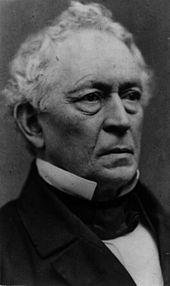Edward Everett
Edward Everett (born April 11, 1794 in Boston , Massachusetts , † January 15, 1865 ) was an American politician of the Whig Party . He was Governor of Massachusetts from 1836 to 1840 and Secretary of State of the United States from November 1852 to March 1853 . He was also President of Harvard University from 1846 to 1849 .
Life
Edward Everett was born in Boston in 1794 to the preacher Oliver Everett and Lucy (Hill) Everett. He studied theology at Harvard University, where he graduated in 1811. He then worked as a Unitarian pastor in his hometown of Boston. In 1815 he accepted a position at Harvard University as Eliot Professor of Greek Literature ; but before he took up the professorship, he went on a research and study trip to Europe. He studied at the University of Göttingen and was the first American to be awarded a Dr. phil. PhD . In 1819 he took up his Harvard professorship, in 1820 he was elected to the American Academy of Arts and Sciences and in 1831 to the American Philosophical Society .
From 1825 to 1835 he was a member of the US House of Representatives and from 1836 to 1840 Governor of Massachusetts. Then he was first as successor to Andrew Stevenson American envoy to the United Kingdom and then professor of Greek history at Harvard University, as its president he served from 1846 to 1849.
On November 6, 1852, President Millard Fillmore brought him into his cabinet and made him Secretary of State, replacing the late Daniel Webster . Everett held that office until March 4, 1853, when Fillmore's tenure as president also ended. He was succeeded by William L. Marcy . After his brief stint as Secretary of State, he served as a Senator in the US Senate . In the presidential election in 1860 he ran for the Constitutional Union Party as a candidate for the office of vice president, but failed because of Abraham Lincoln's candidate for office, Hannibal Hamlin .
On November 19, 1863, one of the largest war cemeteries of the Civil War was inaugurated near Gettysburg , Pennsylvania . Edward Everett was the keynote speaker for the ceremony, followed by President Abraham Lincoln, who delivered his legendary " Gettysburg Address " greeting . The next day, Everett commended Lincoln's speech in a letter to him: “ I should be glad, if I could flatter myself that I came as near to the central idea of the occasion, in two hours, as you did in two minutes. ”(German:“ I would consider myself lucky if I could claim to have approached the core of the matter as much in two hours as you did in two minutes. ”)
The town of Everett in Middlesex County and Mount Everett in Berkshire County are named after Edward Everett. His son William sat in Congress for Massachusetts from 1893 to 1895 .
literature
- Jeffrey Mauck: Edward Everett. In: Edward S. Mihalkanin (Ed.): American Statesmen: Secretaries of State from John Jay to Colin Powell . Greenwood Publishing 2004, ISBN 978-0-313-30828-4 , pp. 188-190.
- Meyer Reinhold : Everett, Edward. In: Ward W. Briggs (Ed.): Biographical Dictionary of North American Classicists. Greenwood Press, Westport, CT / London 1994, ISBN 0-313-24560-6 , pp. 165-167.
- Emory Washburn: Tribute to Edward Everett. Special meeting. In: Proceedings of the Massachusetts Historical Society. Volume 8, JSTOR 25079332 , Jan. 1, 1864, pp. 101-170.
- Address of the Hon. Edward Everett AT THE consecration of the national cemetery at Gettysburg; 19th November, 1863, WITH THE DEDICATORY SPEECH OF PRESIDENT LINCOLN, And The other Exercises of the Occasion. - Internet Archive Little, Brown and company Boston, 1864.
- Massachusetts Historical Society (Ed.): Tribute of the Massachusetts Historical Society, to the memory of Edward Everett, January 30, 1865. - Internet Archive
- A memorial of Edward Everett, from the city of Boston. - Internet Archive Printed by Order of the City Council, Boston 1865.
- Richard Henry Dana: An address upon the life and services of Edward Everett; delivered before the municipal authorities and citizens of Cambridge, February 22, 1865. - Internet Archive Dakin and Metcalf Cambridge, Mass. 1865.
- Dorchester Historical Society (Ed.): The centennial anniversary of the birth of Edward Everett. - Internet Archive Municipal printing office Boston, Dorchester, Boston, Mass. 1879.
Web links
- Edward Everett in the Biographical Directory of the United States Congress (English)
- Edward Everett in the National Governors Association (English)
- Entry on Edward Everett in the Database of Classical Scholars, written by Meyer Reinhold (English)
- Edward Everett in the Miller Center of Public Affairs of the University of Virginia (English)
- Edward Everett in the database of Find a Grave (English)
- Edward Everett Papers Harvard University Archives
Individual evidence
- ^ Member History: Edward Everett. American Philosophical Society, accessed August 2, 2018 .
- ↑ loc. Gov
| personal data | |
|---|---|
| SURNAME | Everett, Edward |
| BRIEF DESCRIPTION | American politician |
| DATE OF BIRTH | April 11, 1794 |
| PLACE OF BIRTH | Boston , Massachusetts |
| DATE OF DEATH | January 15, 1865 |
| Place of death | Boston , Massachusetts |





